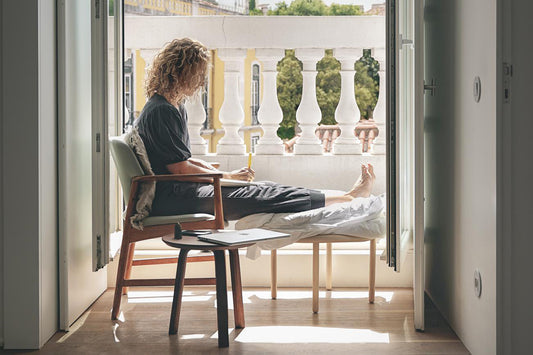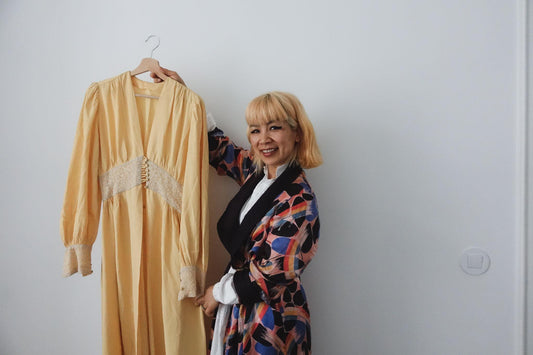Ekta, a Swedish artist, stayed with us.
He was just starting to work on a new piece when we dropped by his apartment for a chat.
I like restrictions a lot. I don't want too many options. So, as soon as you have something on the canvas, you kind of paint yourself into a corner. Sometimes, you get to a point quite fast, where I can't move in any direction and then, it's a matter of starting to remove stuff, as opposed to adding. Normally, my process is more about removing than adding. When I start to feel that I'm making decisions that are pure decoration, even if I think it's good work or bad work, then it's finished. As soon as I get the feeling that I'm putting things in places that don't need to be there, it's kind of like decorating the language; instead of cutting it down to the essence of what I want to say, you make the sentence very long and very beautiful, and you lose the information.
Synthesis is a thing that occurs when I'm working. Normally, I don't think about the process, only when I talk about it, like now. For instance, I'm a very tidy person. When I'm in my flat, I want things to be in an order. In life, that's not a problem for me. But when it appears in my work, I go absolutely crazy, because it's obsessive-compulsive behaviour and, if I don't think about it, it takes over the work and I end up putting things in the 'right' place. And I want to put things in the 'wrong' place. It's a kind of struggle. Some self-sabotage, you know... I kind of know how to make a composition, but I don't want to make 'that' composition, I want to do something else, so I push myself to go beyond that, and not design it too much.
Yesterday, I was painting, and because we were filming, I stayed around a bit longer. But, especially when I'm painting in a public space, the moment I have that feeling, I want to leave that place immediately. I'll take a photo, I won't even look too much at the painting, go, and then I look at the photo later in the evening, or maybe the next day, and evaluate it.
When you paint illegally, the restriction is time. But after 15 minutes in a spot, it's established that even the people passing by, they won't even see me painting. So I don't wanna spend too much time in a spot.
And normally, that work will be removed or painted over by someone else, or maybe it was made in an abandoned place in the countryside, and I don't have any reason to go back. So, normally, I don't see it again, and that's quite a nice feeling. Because you reach a point where I can't add anything or I can't remove anything, and it doesn't matter if I think it's bullshit or if it could be a good painting.
In the studio, it's different, because I can't leave it. That thing is there for as long as I want it to. That game becomes a little bit difficult sometimes, because you work on things too much or for too long... but also, when things come too fast, it's also not good.I'm more relaxed working in the street than in the studio. For me, the quality of the work is normally better in the street. I always struggle with things in the studio.
It's good to work away from home, because I have no traces of myself in this room. In my studio, I have all my books, marks on the wall... I don't know, you are surrounded by yourself, and it's a disaster for working. Of course, the studio is more comfortable but working in different places gives me new levels of excitement. Just going out in a new city, I can get knocked over by new inputs of information. So, if so much new stuff is coming in, I think something new will have to come out as well.
It feels more free, to do non-commissioned works. Because I don't need to be pre-approved. I mean, my work is approved by me, and that's it. Not because I believe I'm being political in my work or anything. Because I don't think I am. What I think is important with public works is to push for people's understanding of the aesthetics.
But not in an academic way, just understanding in a sense of getting something out of the piece or not. And if you don't, you can say it, it's fine. To me, that's the most important thing about public works: to present ideas to people that don't go to museums or galleries. And then, you don't even have to think about whether something is art or just an accident. You just do it in your own personal style and that's it.
And there's this kind of idea of being earnest and working hard, which took me a while, because sometimes, "you did this bullshit in 30 seconds and you call yourself an artist?!" and it takes some time to get confident with those comments but then you understand you put X amount of hours to build the confidence to actually do that and it's not so much about the fact that it takes 30 seconds to make but what's behind it.
I don't mind that people see my work and think it's bullshit but if they think that it's bad, not because they don't like it but because they think I didn't put any effort in doing it, that, I really care about.
I don't usually sign my work but, if I really like a piece, I find a way of writing my wife's or one of my kids' names on the painting. Really small. In that case, I like to pass by my street works and see that it's still there. Because it's more like a personal message, you see. Otherwise, I'm not really interested in seeing them again.
In Lisbon, I've been registering colours a lot but also grids and systems. I can get very obsessed with the brickwork you have here, for example. But I'm not interested in construction, just the aesthetics of it. Even the bricks people use to shut doors of abandoned houses or stores, blocking anyone from entering... or foundations of buildings. The bricks I'm used to seeing are a different size. Here, they're quite big and have different shapes, a shape I don't recognise, and a brick is such a common object, that I get very excited when I find it in a different form.
Also, how you arrange your garbage bins is amazing. I took so many photos of garbage bins in Lisbon. It's like, so many unconscious compositions everywhere. Of course, I also see monuments and styles of architecture, the cool amazing castles, but I'm not more interested in that than the general person. So, on the train to Sintra, as I was passing the suburbs, I was like, whoa!, I wanna go here! For sure, I would assume people here consider that a horrible example of architecture, but there is also some beauty in that, I think. Not necessarily in the context of the suburb, but there's just something about the buildings.
Good taste is a job for the designer and the architect, but I think when you make your own style for your house or your shop, that's just great. I remember when I lived in East London, Jamaican barbershops always had the best signs. And they were handmade, and probably made by people who don't even enjoy drawing, but "why would I pay a guy to draw a sign? I'll just do it myself, fuck it." It's a technical disaster, but such amazing work. I don't even laugh at it, but you smile, because this person made his own sign for his own shop.
When you start having kids, you begin to understand that work is not everything. Ten years ago, I'd be working around the clock, always working or thinking about work. Now, also because of the confidence I didn't have back then, I don't feel I need to work as much. Before, I wouldn't allow myself to waste time, including going out just to get lunch. Now, I arrive at my studio at 8am, make coffee, drink the coffee, and lie down for a nap for 15 minutes before I start working. And sometimes, I even leave my studio earlier, to go get the kids. Having a family just changes everything. Without that and the kids, I wouldn't have reached this point, where I think that I don't need to always keep producing.
It's impossible to separate this kind of work from my family life. Now, I don't to want let my mind think about work if my kid is telling me something about his day. And it's cool, because he's almost ten, he understands what I do, and sometimes he takes pictures of graffiti he passes by, because he knows I like that stuff, and it's great, because it means he's thinking about me.
I moved to Gothenburg in 2005. I came from London, been there for nine years. And I really hated it, straight away. I left Sweden when I was 18, 19, me and my friend moved to London. Straight out of my mom's place. So moving back to Sweden was really weird. I mean, I spent my whole 20s in London and that obviously had a big effect on me, so I had a lot of problems. Mainly with the whole country, not just the city. I mean, I didn't like the city, but I really had problems with the mentality of people. It was just when I had kids that I started to appreciate it, as well as all the things that I previously hated about the place. And now I really like it. And it's my home.




